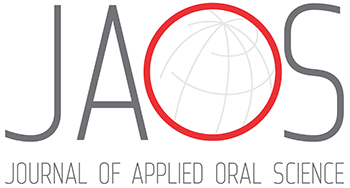Objective
This study evaluated the fracture toughness (FT) of denture base and autopolymerizing reline resins, with and without thermocycling (T).
Material and Methods
Specimens of each material (denture base acrylic resin - Lucitone 550 – L; autopolymerizing reline resins - Ufi Gel Hard–UH, Tokuyama Rebase II-TR, New Truliner–NT and Kooliner-K), were produced, notched and divided into two groups (n=10): CG (control group of autopolymerizing reline resins and L): FT tests were performed after polymerization; TG (thermocycled group): FT tests were performed after T (5°C and 55°C for 5,000 cycles). Results: Results (MPa.m1/2) were analyzed by two-way ANOVA and Tukey's test (p=0.05). L exhibited the highest FT mean values in both groups (CG - 2.33; TG - 2.17). For the CG groups, NT showed the highest FT (1.64) among the autopolymerizing reline resins, and K the lowest (1.04). After T, when the autopolymerizing reline resins were compared, a statistically significant difference in FT was found only between the NT (1.46) and TR (1.00).
Conclusions
Thermocycling increased the FT of K and did not influence the FT of L, UH, TR and NT.
Acrylic resins; Denture bases; Thermic treatment


